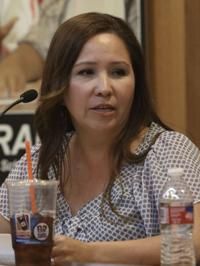The Tucson Unified School District will put more than $1.1 million into stocking libraries with multicultural books next school year.
The expenditure was green-lighted by the TUSD Governing Board Tuesday night on a vote of 3-2. Board Members Mark Stegeman and Michael Hicks voted no, while Adelita Grijalva, Kristel Foster and Cam Juarez approved.
There was no public discussion of the matter.
The initiative, which will be paid for using the district’s desegregation fund, was put together in consultation with the plaintiffs and special master — a desegregation expert tasked with overseeing TUSD’s efforts.
Under the desegregation order and a district-initiated strategic plan, TUSD is obligated to develop and implement a K-12 curriculum that is multicultural, integrates racially and ethnically diverse perspectives and experiences, and builds respect and understanding among students from different backgrounds.
There is a dearth of multicultural literature in TUSD classrooms and libraries, and on average, the materials are anywhere from 15 to 18 years old.
In explaining the need for the purchase, the TUSD Multicultural Curriculum Department said teachers in TUSD have difficulty accessing quality multicultural books and engaging students in critical inquiry.
“This will bring in books that are up-to-date with current issues that students can relate to,” said Steve Holmes, assistant superintendent in charge of curriculum and instruction.
Research shows multicultural literature is an effective support to classroom instruction for diverse populations like TUSD.
Critics of the district and its ethnic studies program, however, have long said that resources would be better used on traditional subjects, like reading, writing and math.
Arizona’s two previous state superintendents of public instruction have also strongly opposed texts utilized in TUSD, arguing that they promote resentment against a race or class of people — Anglos specifically.
Not only are existing resources old, many contribute to maintaining negative cultural stereotypes — but not the kind that most critics of TUSD would think.
According to Desiree Cueto, director of TUSD’s Multicultural Curriculum Department, the newer materials provide more realistic portrayals of minority characters, who previously weren’t often depicted with dignity or resilience.
“We are getting away from a single-lens focus,” Cueto said. “There are more authors of color, so you’re not only going to see African Americans in poverty or Hispanics as migrant workers. When only one story is being told it becomes a stereotype and we’re working to round out those portrayals.”
Unlike TUSD’s culturally relevant curriculum, which is required under a federal court order and geared toward Mexican-American and African-American students, Cueto’s work in the multicultural department has a broader focus that encompasses all of the cultures the district serves, including that of Anglo students, across all content areas.
Research was conducted to ensure the new books selected are rich in ideas, invite a number of interpretations, avoid stereotypes and promote intercultural understanding.
In all, the district is purchasing more than 102,000 books from Barnes & Noble and Follett, representing 485 different titles.
Improving bus service
In other business, the Governing Board approved the purchase of transportation routing software, which will cost $370,000 over the next five years.
That action follows a recommendation from an efficiency audit conducted last year, which found state-of-the-art software would improve the effectiveness of routes, reducing the miles operated and the driver/monitor time for a route.
TUSD’s current software has been in use since 2009 and relies on maps that are not the most current or most accurate. It also does not allow routers or schedulers to run scenarios and examine the costs.
Deseg legal fees
The board also agreed to pay more than $394,500 in attorney fees for the Latino plaintiffs in its desegregation case. The payment must be made within 30 days and it will come out of the desegregation fund as a cost of monitoring and compliance.




